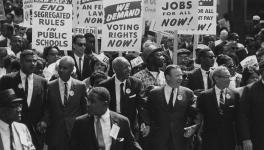Has Bernie Sanders Shifted the Domestic Debate to a Progressive Agenda?
The Democratic Party presidential candidate debate that took place Saturday between Bernie Sanders, Hillary Clinton, and Martin O'Malley, was heated when it came to campaign financing and reining in Wall Street.
BERNIE SANDERS: I have never heard a candidate, never, who has received huge amounts of money from oil, from coal, from Wall Street, from the military-industrial complex, not one candidate--all these, these campaign contributions will not influence me. I'm going to be independent. But why do they make millions of dollars of campaign contributions? They expect to get something. Everybody knows that.
HILLARY CLINTON: He has basically used his answer to impugn my integrity. Let's be frank, here.
SANDERS: No, I have not.
CLINTON: Oh, wait a minute, Senator. You know, not only do I have hundreds of thousands of donors, most of them small, and I'm very proud that for the first time a majority of my donors are women, 60 percent.
PERIES: Now joining us from Ithaca, New York to discuss the debate is Jeff Cohen. Jeff is a director of the Park Center for Independent Media at Ithaca College, and he was the founder of the media watchdog FAIR. He's also a co-founder of RootsAction.org. Jeff, thank you so much for joining us.
JEFF COHEN: Thank you.
PERIES: So Jeff, let's begin by unpacking this debate and controversy over campaign financing, and reining in Wall Street. Who did you think won that debate?
COHEN: I think it's pretty clear that Bernie Sanders is scoring points. And I've got to say, for critics on the left that have sort of a strategic objection to working inside Democratic party primaries, it's because Bernie is in the Democratic party primaries and caucuses that he's been able to take this message to millions of people and to be heard, you know, across the country and have these huge crowds. It's because of that strategic decision. And what he's accomplished I think, and this debate showed it this weekend is, you know, he's taken socialism out of the closet. He's put wealth and inequality center stage. No one has made the issue of Wall Street--he kept saying Wall Street, their practice is greed and fraud. It's greed and fraud. And he put that center stage.
At the very first debate when Bernie said, it's a sentiment people have but it's never said on mainstream TV, Bernie said Congress doesn't regulate Wall Street, Wall Street regulates Congress. And so I really think that the whole debate over domestic agenda has been shifted because of Bernie's presence, and I thought he was as strong this weekend as ever on those issues.
PERIES: Now, Jeff, people like Ralph Nader say that the fact that Bernie Sanders is running within the Democratic party apparatus is problematic for stimulating debate. And he was saying that if he had run as an independent or left that option open, that he would have been more successful at drawing the debate further left, and particularly representing better those points that you had just mentioned in addition, that he would actually be able to use his candidacy and opening up this kind of debate on the left as leverage moving forward in this campaign.
COHEN: Yeah. You know, I have a lot of respect for Ralph Nader, he's a hero of mine. I just think he's wrong on this. I mean, if Bernie had run as an independent all they'd be asking him about is, are you going to be a spoiler in November? Or you know, are you going to help President Cruz or President Trump get elected? That's all you get talked about. Bernie Sanders has taken socialism out of the closet. There's been more mainstream discussion and debate. And I'm on a college campus. More people are talking about socialism today because Bernie chose to run inside the Democratic party caucuses and primaries. So I think the proof is in the pudding.
PERIES: While I agree with you, Jeff, that we can now talk about socialism in the mainstream political sense, I am again and again reminded about the previous debate when Anderson actually confronted him about is a socialist candidate electable in this country? Your thoughts on that.
COHEN: Time will tell. But you know, there's the famous poll from a couple years ago, I think it was Pew, when Obama was being called a socialist. And people under 30 had a favorable, more favorable view of socialism than they did of capitalism. And also the favorability of socialism was higher among African-Americans and Latinos, obviously young people. I bet if they did that poll again they'd find that favorability has shot up. But the key is, I mean, Bernie's not going around socialism, socialism, socialism. He's talking about campaign finance corruption. He's talking about Hillary Clinton getting all this money from Wall Street. He's talking about the, you know, establishment politics means that the pharmaceutical industry and the insurance companies are blocking us from having national health insurance.
So I think that the whole domestic agenda of us being governed by the 1 percent, and we're the 99 percent, that that's never been put forward as clearly to so many millions of people in recent decades than by Bernie Sanders. In fairness to Ralph Nader, who is again, is one of my heroes, he did get some of these issues on the mainstream discussion. But mostly they kept saying, are you a spoiler, are you a spoiler, are you a spoiler? And Bernie Sanders has made a different strategic choice. And I think the domestic agenda, the full critique of our corporate society, our corporatism, has gotten out there because Bernie is in the Democratic primaries and caucuses, and he's in these debates.
It's obvious [inaud.] the head of the DNC is a Hillary supporter. They're only having a few debates when they should have many. The Republicans are having many. They've placed this last debate on Saturday night, which is one of the lowest turnouts for TV viewership. So the game is rigged. But as far as the game being rigged, Bernie has really accomplished a lot in terms of pushing a left, progressive, domestic agenda.
PERIES: And one of the other issues that Bernie has been very articulate at representing is really the inequity in this country and representing more the mainstream. Somewhat of a convergence between the issues that the Occupy Wall Street was raising. And now it's taking off in a big way on university campuses. And if you see who is surrounding Bernie Sanders at rallies and so on it's a lot of young people. And so give us a sense of what Bernie has to offer in terms of this generation.
COHEN: Yeah, I think that Bernie is--you're right to locate it with Occupy. That he's taken the message Occupy and brought it to a real broad audience. And no one does it better in talking about how much wealth and income gain is just going to the 1 percent. He seems to say it every ten minutes in these debates, even when the question isn't about that. But in terms of, like--I'm on a campus. The people that are politically active, there's no debate. Those that are working in electoral politics are generally supporting Bernie.
And in terms of your issue of college, I mean, Bernie has done a brilliant job of connecting that if we had a tax on Wall Street speculation, a small tax on every Wall Street transaction, you could make public education free. Period, end of discussion. He's got the figures. He doesn't back down from it. And that kind of thing really captures the imagination of young people. And when you look at the polls that show people under 30 are not afraid of the word socialism, indeed they're critical of this thing called capitalism, part of it is for young people college education tuitions have skyrocketed, and there aren't jobs out there. And Bernie did a good job of talking this Saturday night about infrastructure jobs.
So I mean, it's not a mystery why he's connecting with young people. It's not just college tuition. It's this idea of taxing the wealthy so we can get people jobs again. And a big point that Bernie has made all over his stump speech is that if you combat climate change, another issue big for people under 30, it can be a jobs program, that moving our country to a renewable economy is really jobs [intensifying]. It's decentralized, it's good for economy. It's good for local economies. It's good for local jobs, it's good for jobs across the country. That transformation is a jobs program. And Bernie said that as well as almost anyone.
PERIES: And then talking about jobs, the issue of minimum wage was a big contending issue with Bernie supporting the $15 an hour minimum wage, and Hillary saying $12 an hour. Who do you think scored here?
COHEN: Yeah. I think that Bernie is scoring points, but the interesting thing is Hillary wouldn't be taking the position she's taking except for the Bernie movement. You know, her position at the debate was, well, $12, but if other cities want to go to $15, great.
And trust me that the key here is the political revolution has got to go beyond Bernie. Whenever the Bernie campaign ends the issues that he has raised about campaign finance, about taxing Wall Street, about providing national health insurance for all single-payer, about free college tuition. No matter who the president is, even if it's President Hillary Clinton, that movement that is galvanized around Bernie, which involves a lot of young people, has got to be out in the streets and very independent, and carrying forward these issues until we win on these issues. But I, I really do, for all my criticisms of Bernie Sanders on foreign policy, his enunciation, his eloquence on domestic agenda has really transformed things in our country. And it's especially felt on college campuses, not just my own.
PERIES: And one issue, big issue, that occupies all of us is the fact that he has already stated that he's going to put his, if he doesn't win the Democratic nomination, he's going to put his support behind the Democratic party candidate, which in this case may be Hillary. In fact, all polls are directed that way at the moment. So we have a situation where he is stimulating and getting everybody excited about this election campaign, and then we may end up with Hillary. What do you say to that?
COHEN: I say that if you go online and you see what people are doing that are, have been inspired by Bernie, these people are meeting each other. They're meeting people face to face, they're meeting each other online, and there's no reason that the movement for radical economic change and social justice and racial justice, it's not going to end depending on what Bernie does or doesn't do. I just think that people need to give Bernie his due on what he's accomplished. And the people have to go beyond Bernie. And that's going to happen whenever Bernie ends the, the presidential race. I think a movement--and movements--have been fortified because of Bernie's campaign. And what we do with that will be up to us. It's not up to Bernie Sanders.
PERIES: All right. Jeff, this is going to be a long road, this election campaign, and we hope you join us soon.
COHEN: Thank you.
PERIES: And thank you for joining us on the Real News Network.
Courtesy: TRNN
Get the latest reports & analysis with people's perspective on Protests, movements & deep analytical videos, discussions of the current affairs in your Telegram app. Subscribe to NewsClick's Telegram channel & get Real-Time updates on stories, as they get published on our website.
























